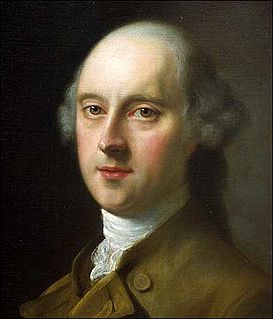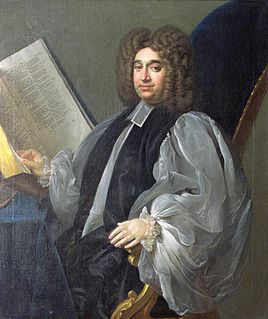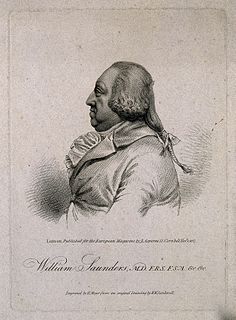
Brook Taylor was an English mathematician who is best known for Taylor's theorem and the Taylor series.

Thomas Tanner was an English antiquary and prelate. He was Bishop of St Asaph from 1732 to 1735.

William Legge, 2nd Earl of Dartmouth, PC, FRS, styled as Viscount Lewisham from 1732 to 1750, was a British statesman who is most remembered for his part in the government before and during the American Revolution, and as the namesake of Dartmouth College.
George Atwood was an English mathematician who invented a machine for illustrating the effects of Newton's first law of motion. He was also a renowned chess player whose skill for recording many games of his own and of other players, including François-André Danican Philidor, the leading master of his time, left a valuable historical record for future generations.
Robert Woodhouse was an English mathematician.

William Borlase, Cornish antiquary, geologist and naturalist. From 1722, he was Rector of Ludgvan, Cornwall, where he died. He is remembered for his works The Antiquities of Cornwall and The Natural History of Cornwall (1758), although his plans for a parish-by-parish county history were abandoned.

David Gregory FRS was a Scottish mathematician and astronomer. He was professor of mathematics at the University of Edinburgh, and later Savilian Professor of Astronomy at the University of Oxford, and a proponent of Isaac Newton's Principia.

John Theophilus Desaguliers FRS was a British natural philosopher, clergyman, engineer and freemason who was elected to the Royal Society in 1714 as experimental assistant to Isaac Newton. He had studied at Oxford and later popularized Newtonian theories and their practical applications in public lectures. Desaguliers's most important patron was James Brydges, 1st Duke of Chandos. As a Freemason, Desaguliers was instrumental in the success of the first Grand Lodge in London in the early 1720s and served as its third Grand Master.

Philip Bisse was an English bishop.
George Turnbull was a Scottish philosopher, theologian, teacher, writer on education and an early but little-known figure in the Scottish Enlightenment. He taught at Marischal College, Aberdeen, worked as a tutor and became an Anglican clergyman. Aside from his published writings on moral philosophy, he is also known for the influence he exerted on Thomas Reid and as the first member of the Scottish Enlightenment to publish a formal treatise on the theory and practice of education.
Sir Richard Vynne Southwell, FRS was a British mathematician who specialised in applied mechanics as an engineering science academic.
Sir William Fordyce was a Scottish physician.
William Braikenridge (c.1700–1762) was a Scottish mathematician and cleric, a Fellow of the Royal Society from 1752.

Richard Warren (1731–1797) was an English physician, a prominent society doctor in the later 18th century.

Dr William Saunders FRS FRSE was a Scottish physician who was the first President of the Royal Medical and Chirurgical Society.

William Trail or Traill DD LLD FRSE MRIA was an 18th/19th century Scots-born mathematician, remembered for his mathematical text books. For the majority of his life he served church duties in Northern Ireland.
John Robertson (1712–1776) was an English mathematician, and a Fellow, clerk and librarian of the Royal Society. His book The Elements of Navigation became a classic textbook.
Cosmo Gordon of Cluny FRSE (1736–1800) was a Scottish politician, agricultural improver and co-founder of the Royal Society of Edinburgh. He sat in the House of Commons from 1774 to 1777 and was a Baron of the Scottish Court of Exchequer from 1777 until his death. He was for several years Rector of Marischal College in Aberdeen.
William Ogilvy Kermack FRS FRSE FRIC was a Scottish biochemist. He made mathematical studies of epidemic spread and established links between environmental factors and specified diseases. He is noteworthy for being blind for the majority of his academic career. Together with Anderson Gray McKendrick he created the Kermack-McKendrick theory of infectious diseases.

John Müller was a German mathematician and engineer.











